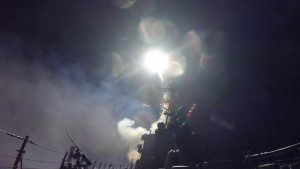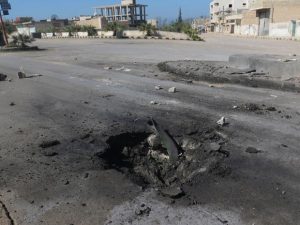 President Donald Trump raised the stakes in Syria with a unilateral strike on Syria Thursday evening. Fifty-nine Tomahawk missiles were launched from the eastern Mediterranean into Syria’s Homs Province from the USS Ross and USS Porter. They struck an airbase called Shayrat in Homs province, which is the site from which the planes that conducted the chemical attack in Idlib are believed to have originated.
President Donald Trump raised the stakes in Syria with a unilateral strike on Syria Thursday evening. Fifty-nine Tomahawk missiles were launched from the eastern Mediterranean into Syria’s Homs Province from the USS Ross and USS Porter. They struck an airbase called Shayrat in Homs province, which is the site from which the planes that conducted the chemical attack in Idlib are believed to have originated.
The US retaliated for Syria’s chemical attack on civilians last week in one of the worst chemical bombings in Syria in years. Five Syrian missiles turned the rebel-held town of Khan Sheikhoun into a toxic kill zone on Tuesday, inciting international outrage over the ever-increasing government impunity shown in the country’s six-year war. The attack appeared to be the deadliest chemical attack in Syria since the August 2013 assault.
Dozens of people, including children, died — some writhing, choking, gasping or foaming at the mouth — after breathing in poison that contained a nerve agent or other banned chemicals. A statement from Turkey, where many of the stricken Syrians were taken after the assault on Tuesday, was the most specific about the cause. Numerous photographs and graphic videos posted online by activists and residents showed children and older adults gasping and struggling to breathe, or lying motionless in the mud as rescue workers ripped off victims’ clothes and hosed them down. The bodies of at least 10 children lay lined up on the ground or under a quilt.
A few hours later, according to several witnesses, another airstrike hit one of the clinics treating victims, who had been sent to smaller hospitals and maternity wards because the area’s largest hospital was severely damaged by an airstrike two days earlier.
The Turkish government issued a statement, “patients were exposed to chemical material (Sarin).” Turkey did not elaborate on how the sarin had been identified in the assault on Tuesday, but it said some of the telling symptoms seen in the victims included “lung edema, increase in lung weight and bleeding in lungs.”
The Syrian government denied responsibility and accused insurgents, saying they use toxic weapons “every time they fail to achieve the goals of their sponsors.” However, only the Syrian military has the ability to carry out such an aerial attack. Russia defended Al-Assad saying Syrian warplanes had struck an insurgent storehouse containing toxic substances to be used in chemical weapons.
On Tuesday night, Britain, France and the United States pushed a Security Council resolution to condemn the attack. Russia, Syria’s main ally, accused Mr. Assad’s enemies of rushing to judgment and issued a veto threat at the United Nations Security Council on a measure condemning the assault.
What Is The Logic Behind Al-Assad’s Chemical Weapons Strike?
 One of the main defenses offered by Mr. Assad’s allies and supporters, in disputing that his forces carried out the strike on Tuesday, is that such an attack would be “a crazy move,” as one Iranian analyst, Mosib Na’imi, told the Russian state-run news site Sputnik. Yet, rather than an inexplicable act, analysts say, it is part of a carefully calculated strategy of escalating attacks against civilians.
One of the main defenses offered by Mr. Assad’s allies and supporters, in disputing that his forces carried out the strike on Tuesday, is that such an attack would be “a crazy move,” as one Iranian analyst, Mosib Na’imi, told the Russian state-run news site Sputnik. Yet, rather than an inexplicable act, analysts say, it is part of a carefully calculated strategy of escalating attacks against civilians.
Syria began shelling neighborhoods with artillery in 2012. First came the artillery shelling, then bombing from helicopters followed by bombing from jets. The Syrian government seeks total victory and is willing to make life as miserable as possible for anyone living in areas outside its control.
Government forces have been herding defeated opponents from across the country into Idlib Province, where the chemical attack occurred. Idlib’s population grew as rebels and civilians moved there from areas recaptured by Assad forces and allies. Syria’s prisoners of war are bused into the province, under the auspices of surrender deals. Al-Assad then uses the presence of al-Qaeda-linked groups in Idlib as an excuse to bomb without regard for the safety of civilians.
Syrian opposition forces cheered the attack and called for continued action against Assad.
REACTION
U.S. officials weighed the possibility that an airstrike against Syrian military targets that could result in the deaths of Russian troops operating in the country. It has been confirmed that American officials notified Russia before the U.S. military launched a missile strike against Syria, the Pentagon said Thursday. Secretary of State Rex Tillerson said the US did not seek approval from Moscow.
Trump’s strike is far riskier than one would have been under Obama because of the presence of Russian troops and military hardware—including sophisticated anti-aircraft units—in the country. “There obviously needs to be a healthy fear of great powers clashing,” says Jonathan Schanzer, vice president for research at the Foundation for the Defense of Democracies, a Washington, D.C.-based think tank. “There obviously needs to be a healthy fear of great powers clashing,” says Schanzer.
Jer 51:11 Sharpen the arrows, fill the quivers! The LORD has stirred up the spirit of the kings of the Medes—he has decided to destroy Babylon. Indeed, it’s the LORD’s vengeance, vengeance for his Temple.
Moscow reacted to the missile strike. Russian senator Viktor Ozerov, head of a committee on defense, told state-run RIA Novosti that the bombings could “undercut” the fight against groups such as ISIS. He said Russia will call for an urgent UN meeting.
The Russian Foreign Ministry said early Friday that it would soon release a statement on the attacks. Russian representatives warned on Thursday that an attack would lead to “negative consequences.”
At Home
Some of Trump’s biggest supporters are furious about his strikes in Syria. On the campaign trail, Candidate Donald Trump was firmly against intervening in Syria. He even demanded that Barack Obama not send troops into Syria and argued against using military force against Bashar al-Assad. America, he argued, was wasting valuable blood and treasure abroad and needed to spend more time nation-building at home. So after he ordered military strikes against a Syrian airfield on Thursday night, at least some of his most vocal supporters say they feel betrayed.
